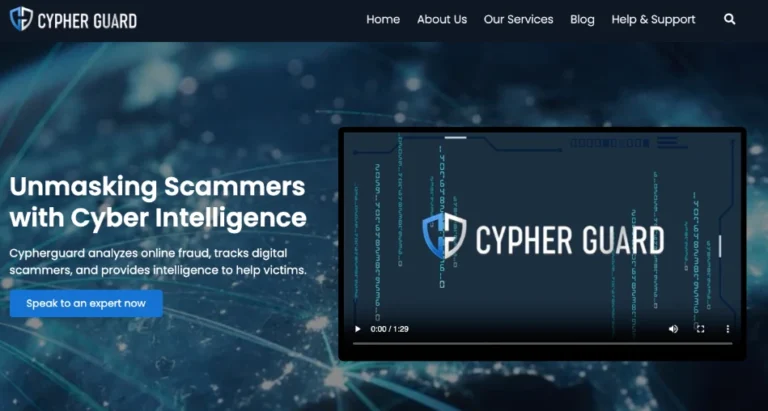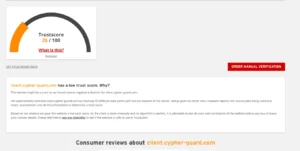Table of Contents
In the digital age, where online scams proliferate, companies like Cypherguard (cypherguard.com) claim to offer hope to victims through cyber intelligence services. However, serious doubts about Cypherguard legitimacy arise from evidence of fake social media likes, followers, and reviews, as well as deceptive practices aimed at boosting brand awareness.
This negative review, updated for July 2025, examines how Cypherguard manipulates its online presence to exploit vulnerable scam victims, drawing on findings from an independent investigation and public data. If you’re wondering “is Cypherguard a scam?” or “is Cypherguard legit?”, read on for a critical look at their artificial efforts.
Fake Social Media Engagement: Purchased Likes and Followers
Cypherguard’s social media presence, including their Facebook page, Instagram account, and X profile, appears robust at first glance, with thousands of likes and followers. For example, their Facebook page boasts 1,930 likes and 2,310 followers, while their X account (@cypherguardau) promotes scam awareness posts like this one.
According to google’s unknown site we published here we decided to check their facebook profile and their claims were turned out to be true, all of profiles we saw there seems to come from Thailand and do not seem anything close to being real (you can purchase likes and followers for a few cheap dollars):

However, an investigation hosted on a Unkown Google Site reviewing cypherguard.com reveals troubling evidence of purchased engagement. Sudden spikes in followers, followed by low interaction rates, align with patterns of fake accounts, as identified by tools like Modash (modash.io).
Comments on their posts, such as generic phrases like “Great job!” or “Very helpful!” from accounts with no profile pictures or suspicious follow ratios, suggest bot-driven activity. The Google Site specifically accuses Cypherguard of buying cheap followers to inflate their social proof, a tactic confirmed by platforms like Upfluence (upfluence.com) that analyze fake engagement. This artificial boosting misleads scam victims, preying on their trust in seemingly popular services.
Inconsistent Geographic Targeting: A Confusing Global Facade
Cypherguard operates as J S Cypher LTD in Israel (registration number 517148748), yet their X bio emphasizes helping Australians, with posts like this scam alert targeting Australian audiences. The Google Site investigation highlights their inconsistent geographic focus, noting promotional content on their landing page targeting the US, UK, Canada, and New Zealand without evidence of local offices or regulatory compliance (e.g., with Australia’s ASIC). This scattershot approach confuses potential clients and raises doubts about Cypherguard legitimacy, as noted in the investigation’s analysis of mixed GEO targeting.
The Australian Competition & Consumer Commission (accc.gov.au) warns that scam recovery services lacking clear regulatory ties can exploit victims. Cypherguard’s lack of transparent licensing outside Israel fuels skepticism about their global claims, making their services appear more opportunistic than credible.
Fabricated Reviews: Building False Trust
On the surface, Cypherguard’s 4-star Trustpilot rating (trustpilot.com/review/cypherguard.com) suggests reliability, with reviews praising their help in crypto scams and fraud cases. However, the Google Site investigation alleges these reviews are fabricated or incentivized, pointing to repetitive language in testimonials on their official website. For instance, reviews from “Alice Huel” or “Isla Owen” use vague phrases like “gave me hope” without verifiable details, a common tactic in fake review schemes, as exposed by Nudgify (nudgify.com).
Scamadviser flags a Cypherguard subdomain (client.cypher-guard.com) with low trust scores and potential scam indicators (scamadviser.com/check-website/client.cypher-guard.com), adding to concerns. A complaint on Consumer Complaints Court (consumercomplaintscourt.com/tag/cypher-guard) further hints at fraudulent behavior, though it may refer to a different entity. The lack of robust, independent feedback on platforms like BBB.org or Sitejabber reinforces doubts about their review authenticity.
Exploiting Vulnerable Victims: A Predatory Approach
Cypherguard’s model—offering blockchain analysis and IP tracing without guaranteeing fund recovery—targets scam victims desperate for solutions. By inflating their social media presence and reviews, they create a false sense of trustworthiness, as highlighted in the Google Site investigation. This artificial brand boosting preys on “poor-minded people” already reeling from fraud, luring them with promises of actionable intelligence that may lack real value.
The Federal Trade Commission (ftc.gov) warns that recovery services often exploit victims further, charging for reports that don’t deliver results. Cypherguard’s lack of transparent success stories, combined with their aggressive social media tactics, aligns with this predatory pattern. Scamwatch (scamwatch.gov.au) similarly advises caution with unverified recovery firms, urging victims to prioritize regulated authorities.
Conclusion: Avoid Cypherguard’s Deceptive Tactics
Is Cypherguard a scam? While not conclusively fraudulent, their reliance on fake social media likes, followers, and potentially fabricated reviews—coupled with inconsistent geographic targeting—severely undermines Cypherguard legitimacy. The Google Site investigation exposes their artificial efforts to inflate brand awareness, exploiting vulnerable scam victims for profit. Their Facebook, Instagram, and X profiles may look active, but the evidence suggests much of their engagement is purchased, not earned.
For safer options, turn to regulated authorities like the ACCC or FTC, or seek firms with verified reviews and clear licensing. Until Cypherguard addresses these deceptive practices, scam victims should steer clear. Share your experiences below to warn others about their questionable tactics.




